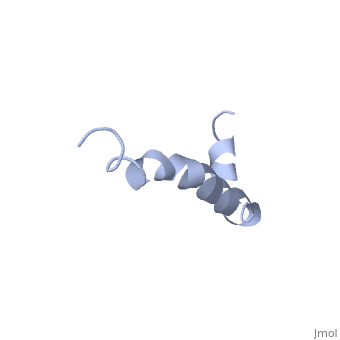Amyloid beta
From Proteopedia
| |||||||||||
Neurotoxicity
Generation of Radicals Amyloid beta produces reactive oxygen species, which induces oxidative stress and inflammation.[2]
Pore Formation Amyloid beta can adhere to endothelial cell walls and create lesions, eventually a large deposite will cause cerrbral hemorrhage. The pores cause loss of calcium homeostasis and an influx of Ca2+ into neurons.[2]
Interaction with tau Tau proteins function to stabilize microtubules [[1]]. Association between Tau proteins and amyloid beta results in dissociation of tau from microtubules which collapses the axonal structure leading to the death of neurons.[2]
Binding ApoE, ABAD, and catalase By binding these proteins amyloid beta alters the normal activities and leads to over production of amyloid beta and oxidative stress.
Prevention
The most promising prevention of amyloid beta has been to prevent the enzymes responsible for its creation. AF267B which is a muscarine receptor that activates aplha-secretase and reduces tau pathology.[2] Thus far no true treatment or prevention has been determined for Alzheimer's.
References
- ↑ 1.0 1.1 1.2 1.3 Crescenzi O, Tomaselli S, Guerrini R, Salvadori S, D'Ursi AM, Temussi PA, Picone D. Solution structure of the Alzheimer amyloid beta-peptide (1-42) in an apolar microenvironment. Similarity with a virus fusion domain. Eur J Biochem. 2002 Nov;269(22):5642-8. PMID:12423364
- ↑ 2.0 2.1 2.2 2.3 2.4 2.5 2.6 2.7 2.8 2.9 Rauk A. Why is the amyloid beta peptide of Alzheimer's disease neurotoxic? Dalton Trans. 2008 Mar 14;(10):1273-82. Epub 2008 Feb 12. PMID:18305836 doi:10.1039/b718601k
- ↑ Funke SA. Detection of Soluble Amyloid-beta Oligomers and Insoluble High-Molecular-Weight Particles in CSF: Development of Methods with Potential for Diagnosis and Therapy Monitoring of Alzheimer's Disease. Int J Alzheimers Dis. 2011;2011:151645. Epub 2011 Nov 2. PMID:22114742 doi:10.4061/2011/151645

